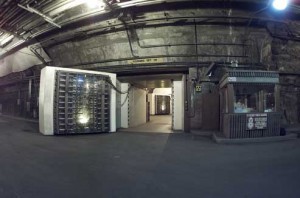Next week, May 19th-22nd, the Arizona Commission on the Arts will hold review panels for its Fiscal Year 2015 annual grants to organizations and schools. In total, 153 applications are scheduled for panel review this year. Programs subject to panel review include Community Investment Grants (CIG), Arts Learning Grants and Festival Grants.
Though panel review is a common and long-standing practice in the world of grantmaking, and though these meetings are often open to the public, there remain a number of questions and misconceptions among applicants about how exactly the process works. With this article we hope to draw back the curtain, shed some light on the process, and dispel some of the myths about grant panels.
Myth #1: Grants are awarded by a clandestine cabal of shadowy puppet-masters!

The Truth: It’s a little less mysterious than that.
Applications are reviewed by panels composed of community members, arts professionals, educators, artists and others actively involved in the nonprofit and service sectors. They are dedicated and knowledgeable volunteers who are passionate about the arts.
The Arts Commission looks for panelists who are willing to commit time and energy to the review process and who exhibit sensitivity in making constructive critical judgments. To help reflect the diversity of the state, the Arts Commission considers gender, geographic representation, and cultural background when appointing panelists. Finally, the agency seeks balance among the professional groups encompassed by the arts, such as practitioners, administrators, and educators. They are appointed by the Arts Commission on a panel-by-panel basis, and may be reappointed to the same panel for up to two consecutive years.
The Arts Commission uses both an internal and external nomination process to identify potential panelists. Individuals may nominate themselves, or others. Have someone in mind for a future panel? Submit a nomination.
Myth #2: Grant Panels meet in secret, behind closed doors, at an undisclosed location!

The Truth: See the first paragraph of this article. Not only do we publically announce these meetings, we want the public to attend!
Review panel meetings are an excellent opportunity for applicants (and those interested in submitting an application in the future) to observe the review process and learn more about the qualities of successful, competitive grant applications. Applicants who attend these meetings regularly report leaving with a better sense of their own strengths and weaknesses and an enhanced understanding of and just what grant panels are looking for in an application. A meeting schedule, including meeting locations, can be found at the bottom of this article.
Myth #3: Panelists don’t understand or appreciate the sort of work I do.

The Truth: This one’s a bit tougher.
Working in the arts means being creative, innovative, and experimental. Often, what we do or how we do it looks nothing like what has gone before. Revolutionary work can be tough to recognize, let alone to evaluate. Furthermore, panels are made up of individuals who arrive with their own values, experiences and biases.
That’s why a big part of our job as a state arts agency grantmaker is to ensure that our processes are fair, transparent and executed in accordance with published criteria. We take our duty in this regard very seriously. No system is perfect, but we continually refine our processes to increase efficiency, clarity, and fairness. Our work begins long before the panelists sit down to review your application. In fact, it starts before you even prepare your application.
First, we work with our board of Governor-appointed Commissioners to determine our goals for a given program. In 2013, for example, we worked with the Commissioners to reimagine our General Operating Support Grants to better align with the agency’s grantmaking objectives, strategic plan and enabling statutes. The result was the Community Investment Grants program.
We then set about designing the criteria by which applicants to this program will be evaluated. These criteria need to be focused enough to provide clear, well-defined expectations for success, while being broad enough to encompass the activities of a wide variety of organizations, each with very particular goals and methods, operating within a wide range of environments.
Once the criteria are defined, we draft guidelines to help applicants produce successful applications full of specific, detailed information about their organization and activities that is directly related to the criteria. We also offer online and in-person training to potential applicants.
Next, we provide extensive training to our panelists on the review process, the program objectives and the criteria. Panelists are given several weeks to review the application materials and are required to submit a preliminary evaluation at least one week prior to the panel meeting. When the panelists convene, the meeting is chaired by Arts Commission board members and Commission staff is on-hand to further ensure that panel discussions stay on track and remain focused solely on the published review criteria. Discussion time is dedicated to each application and each is given serious and thoughtful consideration.
We already talked about who our panelists are and where they come from, but one other attribute bears mentioning: They want to give you funding.
Yes, that’s right. Both the Arizona Commission on the Arts and the panelists who review our grant applications want you to succeed and receive funding. Of course, we need to make sure that the public and private funds entrusted to us are distributed responsibly, and we have designed our application and review process to this end. Still, if we could, we’d fund every organization that is striving to provide opportunities for all Arizonans to participate in and have meaningful experiences with the arts. Unfortunately, funding is limited and so organizations must compete for it.
Our job is to make the playing field as even as possible.
Conclusion
We hope this article has given you a better understanding of the panel review process and we hope you will consider experiencing the process firsthand next week when our panels convene in Downtown Phoenix.
The schedule is as follows. For specific information about the panel schedule or which applications will be reviewed during each session, please contact Kristen Pierce at 602-771-6517 or [email protected].



